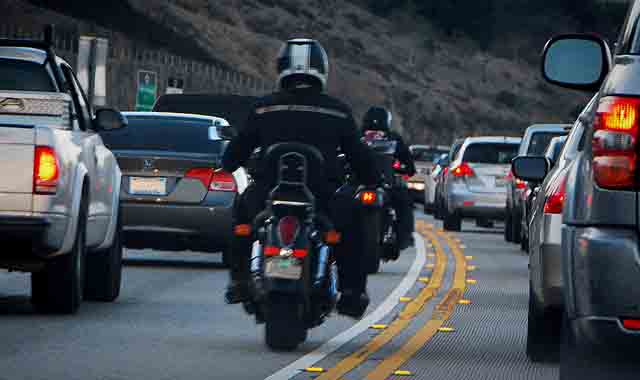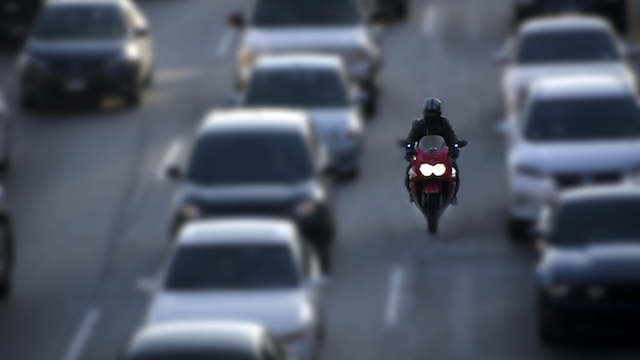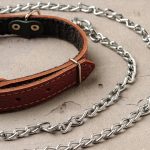In a move that acknowledges the dangers to motorcyclists while stopped in traffic, the state of Utah has passed a law allowing “lane filtering” by motorcycles. The law takes effect in Utah on May 14.
What Is Lane Filtering?
Many news articles regarding this bill are incorrectly stating that Utah Traffic Code Amendment H.B. 149 legalizes lane-splitting in that state, but that’s not quite accurate.
Lane filtering is different than lane-splitting.
Utah’s new law allows motorcycle riders to “filter” to the front of the intersection when traffic is stopped at a light. There are a few caveats:
- Motorcyclists can only lane filter on roads where the speed limit is 45 mph or less, and has two or more adjacent traffic lanes going the same direction.
- Motorcyclists can filter lanes when other motor vehicles are at a complete stop.
- Motorcyclists must travel 15 mph or under when filtering lanes.
Lane-splitting, which is legal in California, by contrast, is driving a motorcycle between rows of stopped or moving vehicles. California law does not limit where lane-splitting can happen, or regulate a speed for lane-splitting. California Highway Patrol Lane Splitting Safety Tips for Motorcyclists merely caution that the danger increases at high speeds.
Why Was the Law Passed?
Utah Highway Patrol said the change in traffic law reflects growing concerns for motorcycle safety. Between 2011 and 2017, there were 1,288 motorcyclists involved in rear-end accidents in Utah. This type of accident, which occurs when motorcycles are stuck in traffic, is particularly dangerous for motorcycle riders, who are often catastrophically injured.
The Motorcycle Safety Foundation (MSF), part of the U.S. Department of Transportation’s National Highway Traffic Safety Administration, says in its National Agenda for Motorcycle Safety that lane-splitting provides a way for motorcyclists to escape being rear-ended in a traffic jam. They recommended further study into the benefits of motorcycle lane splitting to reduce accidents and traffic congestion.

Photo by Chris Yarzab (https://www.flickr.com/photos/chrisyarzab/30615213800)
The famous Hurt Report, back in 1981, showed that lane splitting, and lane filtering, reduces rear-end crashes. A 2015 study at UC Berkeley’s Safe Transportation Research and Education Center found that when lane-splitting accidents happen, they are typically less injurious than other types of collisions. Lane-splitting collisions usually at lower speeds, and result in injuries that are less catastrophic.
How Will This Impact Motorcycle Law in Other States?
While lane-splitting/filtering by motorcycles is legal and widely accepted in much of Europe and Asia, the practice is illegal in every U.S. state except California, and now Utah.
H.B. 149 was enacted on a trial basis, and will repeal on July 1 ,2022 unless steps are taken to implement it permanently. However, if the law is effective and reduces motorcycle accidents, it is likely to become permanent. If this happens, it would be an impetus for other states to follow the lead of Utah and California to pass similar laws.
Currently, Oregon is considering a lane-splitting bill that seems like a hybrid of the California and Utah law. If more states pass similar laws, what may result is a somewhat confusing patchwork of different laws regulating motorcycle lane use across the United States.
According to the American Motorcyclist Association, passing laws to allow lane splitting and lane filtering might be the easy part. Despite the studies showing the safety of these strategies, there is still a public misconception that lane splitting is dangerous. They recommend using public information channels, such as this one, to point out the benefits of lane splitting to motorcycle safety, and reducing traffic congestion reduction.
If you live in Utah, or have friends or family there, share this article to spread awareness about this new law. It’s important for Utah drivers to be prepared when motorcycles pull to the front of intersections.
Have you been injured in a motorcycle accident, or know someone who has? If the accident was completely or partially caused by another person’s negligence, call TorkLaw. Our experienced motorcycle accident attorneys are ready to provide you with a free case consultation and share the damages that you can recover in a motorcycle accident.



